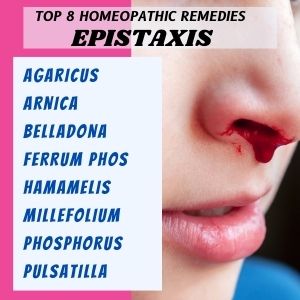Copyright © 2025 Homoeocare. All Rights Reserved.
Powered By
Epistaxis refers to bleeding from the nose, commonly known as a nosebleed. The nose contains a vast network of small, fragile blood vessels, making it vulnerable to injury. Nosebleeds are common in both adults and children, particularly in children aged 3 to 10 years.
There are two main types of nosebleeds:
Several factors can contribute to nosebleeds:
While the diagnosis of epistaxis is often straightforward, it is important to determine the underlying cause, particularly if:
Sometimes, nosebleeds can be a sign of an underlying condition, such as liver disease (e.g., cirrhosis), bleeding disorders, or even cancer.
If the bleeding doesn’t stop after 20 minutes or if it is severe, seek medical attention.

Homeopathy offers remedies that target the underlying causes of epistaxis, helping to manage and prevent recurrent nosebleeds. Some effective homeopathic medicines include:
At HomoeoCARE, the focus is on treating both the symptoms and the underlying causes of epistaxis. By using personalized homeopathic remedies, the treatment works to reduce the frequency and intensity of nosebleeds, providing long-term relief.
For the most effective treatment, it is always recommended to consult a professional homeopathic doctor. They will be able to diagnose the root cause of the nosebleeds and suggest a suitable homeopathic remedy tailored to your child’s specific needs.
Epistaxis, while often a minor issue, can sometimes indicate an underlying health condition. Homeopathic treatments offer a gentle, effective solution for managing and preventing nosebleeds. By addressing the root causes, homeopathy helps to reduce the recurrence of epistaxis, ensuring better health and well-being for your child. If you are looking for the best homeopathic treatment, a consultation with a qualified homeopath near you is always a good step.
HomoeoCARE, we’ve built a reputation as one of the top homeopathic clinics in Mumbai, offering solutions where traditional medicine hasn’t been able to help. Experience the healing power of homeopathy through our online homeopathy consultation with experienced online homeopathy doctors. But don’t just take our word for it check out our case studies to see how we’ve positively impacted the lives of so many individuals and families with our unique approach to healthcare.
Copyright © 2025 Homoeocare. All Rights Reserved.
Powered By